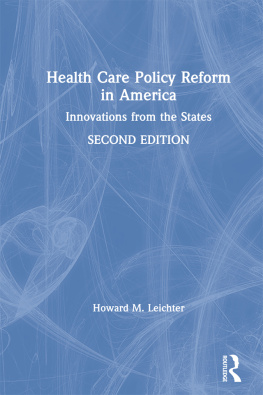HEALTH CARE
POLICY IN THE
UNITED STATES
edited by
JOHN G. BRUHN
PENNSYLVANIA STATE
UNIVERSITY - HARRISBURG
Health Care Policy in the United States
John G. Bruhn, editor
Physician Participation in Medicaid Managed Care
Sunday E. Ubokudom
Healing the Social Body: A Holistic Approach to Public Health Policy
Elizabeth R. Mackenzie
Directing Health Messages toward African Americans: Attitudes toward Health Care and the Mass Media
Judith L. Sylvester
Gender Justice and the Health Care System
Karen L. Baird
Who Cares for Poor People? Physicians, Medicaid, and Marginality
Margaret M. Hynes
Health Care Reform: Policy Innovations at the State Level in the United States
Larry E. Carter
HEALTH CARE
REFORM
POLICY INNOVATIONS AT THE STATE
LEVEL IN THE UNITED STATES
___________
LARRY E. CARTER
First published 1998 by Garland Publishing, Inc.
Published 2018 by Routledge
2 Park Square, Milton Park, Abingdon, Oxon OX14 4RN
52 Vanderbilt Avenue, New York, NY 10017
First issued in paperback 2018
Routledge is an imprint of the Taylor & Francis Group, an informa business
Copyright 1998 Larry E. Carter
All rights reserved. No part of this book may be reprinted or reproduced or utilised in any form or by any electronic, mechanical, or other means, now known or hereafter invented, including photocopying and recording, or in any information storage or retrieval system, without permission in writing from the publishers.
Notice:
Product or corporate names may be trademarks or registered trademarks, and are used only for identification and explanation without intent to infringe.
Library of Congress Cataloging-in-Publication Data
Carter, Larry E., 1949
Health care reform : policy innovations at the state level in the United States / Larry E. Carter.
p. cm. (Health care policy in the United States)
Includes bibliographical references and index.
ISBN 0-8153-3135-5 (alk. paper)
1. Health care reformPolitical aspectsUnited StatesStates. I. Title. II. Series: Health care policy in the United States (New York, N.Y.)
RA395.A3.C376 1998
362.10973dc21
98-26539
ISBN 13: 978-1-138-97587-3 (pbk)
ISBN 13: 978-0-8153-3135-3 (hbk)
For Gene, Mildred and all the Carters.
And for Rachel Floyd
Contents
The research for this book has taken over five years. Many people have contributed in various ways. Special thanks to Prof. David Morgan for his rigorous editing of the dissertation which served as the basis for this work. Prof. James LaPlant made significant contributions to the quantitative studies in as well as supplying needed encouragement. A long list of colleagues also shared their views on health care reform.
Thanks to the staff of the Department of Political Science at the University of Oklahoma for their support. And thanks also to the numerous health care professionals, researchers and scholars who always had time to supply the needed data or information which made this project possible.
AALL | American Association for Labor Legislation |
ADA | Americans with Disabilities Act |
AES | Agriculture Extension Service |
AMA | American Medical Association |
BMA | British Medical Association |
CCMC | Committee on the Costs of Medical Care |
CES | Committee on Economic Security |
DHHS | Department of Health and Human Services |
DRG | Diagnostic Related Group |
ERISA | Employee Retirement Income Security Act |
HMOs | Health Maintenance Organizations |
HMSA | Hawaii Medical Service Association |
HPHCA | Hawaiian Prepaid Health Care Act |
ILWW | International Longshoremens and Warehouse Union |
MSA | Medical Savings Account |
NHI | National Health Insurance (British) |
OHSC | Oregon Health Services Commission |
PHCA | Prepaid Health Care Act (Hawaii) |
PPS | Prospective Payment System |
Health Care Reform
CHAPTER 1
Public Policy, Federalism, and Diffusion
For many Americans, 1991s surprise victory by Harris Wofford (who campaigned for national health care) over Richard Thornburgh in a special Pennsylvania senate race signaled the return, if not the beginning of health care reform in the United States. Not only had the number of Americans without health insurance increased dramatically over the last decade, escalating costs threatened to price many of the working class already insured out of the market as well. Democratic presidential candidate Bill Clinton adopted health care reform as a key element of his campaign platform. Incumbent George Bush never seemed to fully appreciate the salience of the problem. On the other hand, Clintons campaign staff seized the issue promising sweeping reforms to the current system while emphasizing the right of all Americans to enjoy access to the health system at a reasonable cost. Presidential candidate Clinton carefully avoided being explicit as to how such a plan would be implemented or financed.
After narrowly winning the election, President Clinton announced he was putting his wife, Hillary Clinton, in charge of the reform effort. Ms. Clinton responded by assembling a huge task force with representatives from all sectors of the health care industry. Doctors, other health care providers, pharmacists, child advocate representatives, hospital administrators, insurance companiesseemingly every group with an interest in health care reform was invited to participate either on the panel or to testify at one of many scheduled hearings. It soon became clear, however, that though there was a consensus for changing the current system, there was little or no agreement over the direction a replacement program should take. Predictably, the proposal that emerged from the Clinton study was extremely complex and enjoyed little support among key interest groups or congressional leaders. After an initial publicity surge, the Clinton health plan died quietly in Congress, never having reached the floor of either house for a formal vote.
The Wofford senate race and the collapse of the Clinton initiative, have come to represent the beginning and the end of modern American health care reform. While these two events do represent bookends for the most recent reform efforts at the federal level, state governments had already initiated several reform programs long before the Pennsylvania Senate race. State legislatures, fearing more cuts in Medicaid by the Republican Congress, have continued to introduce innovative proposals, many of which involve federal waivers reluctantly agreed to by the Clinton administration.






